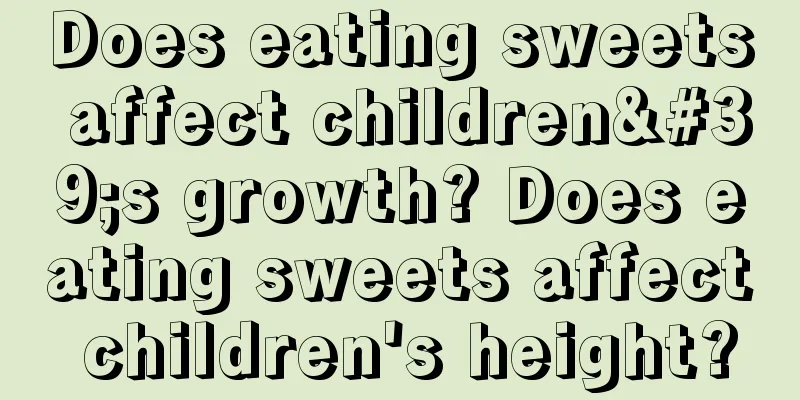Does eating sweets affect children's growth? Does eating sweets affect children's height?

|
Will eating sweets affect children's growth? Many children love to eat sweets. So what are the significant adverse effects of eating too much sweets on the body? Let's introduce to you, will children's love of sweets affect their height development? Please see the detailed introduction of children's love of sweets below Does eating sweets affect children's growth?Children eating sweets will affect their height, so children should eat less sweets If you eat too much sweets, your body will metabolize and produce a large amount of pyruvate and lactic acid, which requires a large amount of calcium to neutralize. The most important thing is that sweets can cause memory loss and obesity in children. Sweets consume a lot of vitamins in the body, especially vitamin B1, which will be completely destroyed, so that the pyruvic acid produced in metabolism stimulates the central nervous system, causing people to lose appetite. The lack of vitamins will also reduce the secretion of digestive juices and increase gastric acid, causing indigestion. In addition, sweets will make people feel full, so when it is time to eat, they will not feel hungry. Insufficient nutrition intake or serious picky eating will affect the growth of children. If you want to grow taller but lack nutrition, of course you can't do it. When children eat too much sweets, their calcium metabolism will be disrupted, which will make the previous calcium supplement plan fail. No wonder children always fail to grow taller. It is not because they do not eat well enough, but because they eat too much sweets. In addition, if too much sugar is not consumed in time and effectively, it will make children fat, which will affect their growth. Which foods are not good for your baby's growth?Foods like carbonated drinks, candies, sweet drinks, etc. are not conducive to children's growth. The main reason is that these foods have relatively few nutrients, but they can increase the baby's sense of fullness and affect the baby's intake of other foods. Some of them also consume calcium in the body, ultimately leading to malnutrition in the baby. Carbonated drinks: Especially cola-type drinks have too high phosphorus content. Excessive drinking can lead to an imbalance in the ratio of calcium and phosphorus in the body, causing developmental delay. Candy and sweet drinks: Eating too much sugar will affect the consumption of body fat, causing fat accumulation, and will also affect calcium metabolism. Professionals point out that if the amount of sugar consumed reaches 16-18% of the total food intake, it can cause calcium metabolism disorders in the body, hinder the calcification of the body, and affect height growth. On the other hand, there is a term "empty calories" in nutrition terminology, which means calories without nutrition. Excessive consumption of beverages containing a lot of sugar will disrupt the digestive system, thus affecting normal eating and causing malnutrition. Junk food: Fried food, puffed food, pickled food, and canned products have large nutritional losses during the production process, and use various additives such as flavors, preservatives, pigments, etc. Although they provide a lot of calories, they contain very little nutrients such as protein and vitamins. Long-term consumption of these foods can lead to malnutrition in children. The harm of sweetsThe side effects of sweets are beyond your imagination Sweetness can please the palate and make people happy, but people often overlook the unexpected health risks hidden behind this sweet taste. What's more frightening is that it can easily make people addicted, especially when eating too much sweets, which can have a negative impact on children in their growth period and cause a physical burden. Usually, the sugar content on the nutrition label in the market is 5 grams, which is equivalent to 1 sugar cube. If 20 grams is equivalent to 4 sugar cubes, the amount is shocking. Whether it is children or adults, it is better to consume less. What are the negative effects of eating sweets? Crisis 1: Obesity crisis Excessive intake of sweets can lead to obesity in children. Many parents provide snacks or desserts between meals, and most of them are high-calorie, high-sugar foods, such as sugary drinks, cakes, biscuits, candies, etc., especially fructose, which is often added to cup drinks. It is the most likely sugar to form body fat quickly. In the long run, it will develop children's habit of sweets and snacks, which can easily lead to obesity. In other words, it is important to pay attention to balanced nutrition during the growth and development period. If you are too obese during this stage, it may hinder your height growth. Crisis 2: Loss of B vitamins The most obvious period of human growth and development is in early childhood and adolescence, and the most important thing needed is vitamin B group to participate in carbohydrate metabolism. When babies start to learn to crawl, walk, and perform biochemical metabolism, the three major nutrients in the diet, carbohydrates, proteins, and lipids, undergo numerous chemical reactions and are converted into energy and calories required by the human body, which requires a large amount of vitamin B group to participate. If too much sweets are consumed, the metabolism of refined sugar in the body will consume a large amount of vitamin B group, causing a rapid loss of vitamin B group, affecting the positive energy required during the development period. Crisis 3: Increased risk of tooth decay The incidence of dental caries is also closely related to the intake of sweets. Excessive intake of sweets, coupled with parents' failure to pay attention to their baby's dental care, will lead to the growth of dental plaque and acidic conditions in the mouth, which will increase the chance of tooth decay. Crisis 4: Sugar addiction Habits will turn into dependence after a long time. Children who are used to eating snacks and desserts will easily become dependent on sugar. In severe cases, they will become addicted. Addicts will even eat more and more sweets. They will have no energy if they don’t eat. This leads to a lack of appetite for regular meals, but they consume a lot of sweets. Over time, this will cause symptoms such as lack of energy and reduced learning ability. Crisis 5: Taste for strong flavors Processed sweets that children like are also high in oil and salt. For example, a piece of salty biscuit may look salty on the surface, but it actually contains one sugar cube. Nutritionist Liu Yili pointed out that if a child develops a sweet habit from a young age, his taste will gradually become heavier, because when children are sweet, they do not like to eat lighter foods. Therefore, it is necessary to check whether their usual eating habits contain high oil, high salt and high sugar. |
<<: Do scented candles help you sleep? Which aromatherapy helps you sleep?
Recommend
When does a baby learn to speak? How to teach a baby to speak?
After a baby is born, the baby's changes are ...
How is Bimbosan milk powder? The milk source is of very high quality
For every 10 cans of milk powder sold in Switzerl...
Does the baby need physical cooling if he has a fever and falls asleep? How to cool him down?
When the baby has a fever and is asleep, should t...
How long after giving birth can you lose weight? The most effective way to lose weight after giving birth
After ten months of pregnancy, I finally gave bir...
What are Pampers Pull-Up Pants like? How to wear Pampers Pull-Up Pants
The Pampers brand is quite popular among people. ...
How to judge milk powder indigestion? Do you need to change milk powder if you have indigestion?
There are many reasons for baby's indigestion...
Can you eat overnight watermelon? What are the dangers of eating overnight watermelon?
What are the dangers of eating overnight watermel...
How to make tassel pendants? Make your home more artistic with tassel pendants
The fresh literary style is pursued by more and m...
Why should you avoid giving birth on an empty stomach?
Pregnant women are often at a loss when they are ...
Why do babies get enteritis? What are the causes of enteritis in babies?
Everyone must have heard of many diseases in life...
Can I eat fresh dates during breastfeeding? Can I eat fresh dates during breastfeeding?
During the lactation period, women are generally ...
What should I do if I have difficulty defecating after a cesarean section? How can I defecate quickly after a cesarean section?
Postpartum constipation is a common problem for m...
How much milk does a baby drink in one month
Babies need to supplement nutrition during their ...
Can I drink milk tea during confinement? Precautions for drinking milk tea during confinement
There are many things that women need to pay atte...
What is the reason for the smell of lochia during normal delivery? What should I do if the lochia during normal delivery has a bad smell?
Natural birth is the healthiest way of childbirth...









